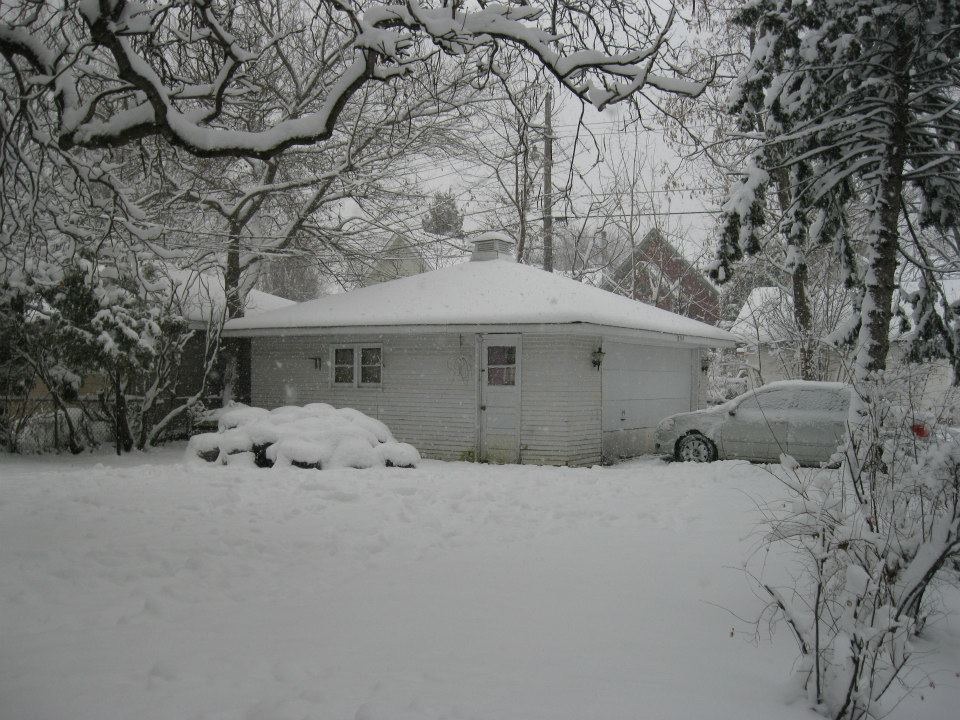By CHRIS KELSEY

Often, Jim left for work at 5:30 am. I’d hear the old Volvo growl to life, struggle into the snowy lane, and twitter and squeal as it slowly picked up speed on the icy street going away.
Jim and Bridgette and their kids live in the other half of the rental house we both share. We have two incomes and two cars; they have one income and one car. We have one child (age 2); they have six (ages 7 – 21), who are of three fathers and two mothers, but only the youngest two children (who have different biological fathers) have consistently lived here.
As for our neighbors, the hard math of the matter could be seen in that car. It groaned. The thick scent of diesel hung about, especially in the cold. Being old and low to the ground, that sedan was often stuck in the snow hump at the edge of the driveway after city plows came through. It also had an eight-inch piece of duct tape on the bumper and a spider crack on its remaining side mirror.
Patched together as it was, this car didn’t quite look road salt and winter-weathered. Rather, it simply looked to be disintegrating.
Just before the calendar year turned, the car began to fail. The radiator had cracked. In the middle of the night, just around 2:00, Jim headed out to work on the car. Their kids were upstairs sleeping, so Bridgette went with him. It was -8 and icy. They struggled to stay upright on the hard-packed path our boots had beaten in the snow.
The side door to the garage closed. The car groaned to life. An hour passed.
I was often awake long hours to observe these things. My daughter had a persistent cough, and I was irrationally concerned her breathing might just stop. I slept in her room, but mostly this was me being awake. I listened a lot to the house. I thought too much about work and whether my wife’s post-partum depression was really gone. I couldn’t understand why the floorboards had to be so loud.
Out in the garage, Jim and Bridgette’s car hummed and occasionally cleared its throat. The light in the garage burned, but the garage door remained closed.
Tired, standing there in the darkness next to the crib, I peeked out the blinds and felt like Old Man Kelsey. (“I’m gonna find out what those two are up to!”)
And as the repair attempt was failing, I felt a growing sense of dread that my neighbors were actually dying. I thought about what it would be to find their bodies in the morning, how much regret I’d feel for not having prevented it, and how sad I’d feel for the girls upstairs who, while they were not living in an ideal situation—Who is?—were clearly loved and cared for and knew that and responded to it. They were ages my daughter would one day be. They had their happinesses and hopes.
They were up there sleeping, and I was standing at a window staring out into the sub-zero darkness while their parents went on gassing themselves in a closed garage.
About 90 minutes passed. It was 3:30. The engine stopped. Then, light from the garage spilled into the yard in the direction of the house. Jim had an arm around Bridgette. She was a bit limp.
They really had come close to ending it. Accidentally.
I caught Jim in the back foyer around midnight the following night. I wanted him to know we’d put their cat in the basement two days before because of the weather and left him food and water. I also hoped to find out about the previous night’s incident, which Jim brought up without prompting.
Simply put, he’d looked back and had seen Bridgette about to faint from the carbon monoxide. She still had a headache 24 hours later, he said. He felt awful about it.
“I don’t know why we do those things, man,” he said. He looked at the floor and ran a hand slowly through his hair. “I don’t know how you don’t think about that.”
Abruptly, he asked me about our Christmas, and I asked about his family’s. Pleasantries were exchanged.
“And I tell you what,” he said, bounding back to the previous night and laughing a bit. “I’m still feeling it myself.”
He shrugged and threw out his hands. What else to say? That’s life.
He told me this just after he’d given up on the radiator. He said it in his same, easy-going way. It was a manner that suggested everyone was Jim’s friend, and that the epitaph etched on his tombstone would be, “I don’t know, man.”
He told me this in our shared, unlit hall. It was just our shadows having a midnight chat after he’d spent another hour working on the car, engine running, with the goddamn garage door closed.
Chris Kelsey is a technical writer and editor in Saint Paul, Minnesota. Time permitting, he works on fiction.
Photo by author




